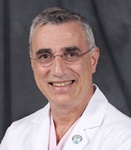Letter from the Shock Trauma Physician in Chief
 I'm Dr. Thomas Scalea, physician in chief of the R Adams Cowley Shock Trauma Center. Every year nearly 8,000 people are brought here with critical injuries that can range from car crashes, motorcycle crashes, falls, and violence related injuries. 97% of those patients survive because of the intricate, complex care that is provided here at the Shock Trauma Center.
I'm Dr. Thomas Scalea, physician in chief of the R Adams Cowley Shock Trauma Center. Every year nearly 8,000 people are brought here with critical injuries that can range from car crashes, motorcycle crashes, falls, and violence related injuries. 97% of those patients survive because of the intricate, complex care that is provided here at the Shock Trauma Center.
When a patient is brought to shock trauma either by ambulance or helicopter, they are immediately brought to the trauma resuscitation unit (TRU). Here, patients are rapidly assessed by a team of professionals who are exclusively trained in trauma care. The assessment includes bedside X-ray, ultra sound and a host of various other tests to determine injury quickly. We believe that if you or a loved one is injured, your best chance for survival is to have care within that first hour of injury. We refer to this as the "golden hour."
It is frightening for families to receive that phone call that their loved one has been taken to shock trauma. When families arrive at the hospital they may feel like they are waiting a long time for answers and want to see their loved one. Please know that we are taking all measures to ensure that the patient is receiving the best possible care. We do our very best to keep families informed and try to have them come to the TRU as soon as possible.
Every case is unique; every course of treatment is determined right here in the TRU in order to save a life. If surgery is needed, there are operating rooms adjacent to the TRU. When surgery is complete, our patients then go to a dedicated unit specific to their injury. One example, for traumatic brain injured patients, they go to the Neurotrauma Unit. Patients stay as long as necessary, then are either discharged home or continue their recovery in a rehabilitation facility.
Sincerely,
![]()
Thomas M. Scalea, MD
Physician-in-Chief, Shock Trauma Center
System Chief for Critical Care Services
University of Maryland Medical System
Francis X. Kelly, Professor of Trauma Surgery
Director, Program in Trauma
University of Maryland School of Medicine
